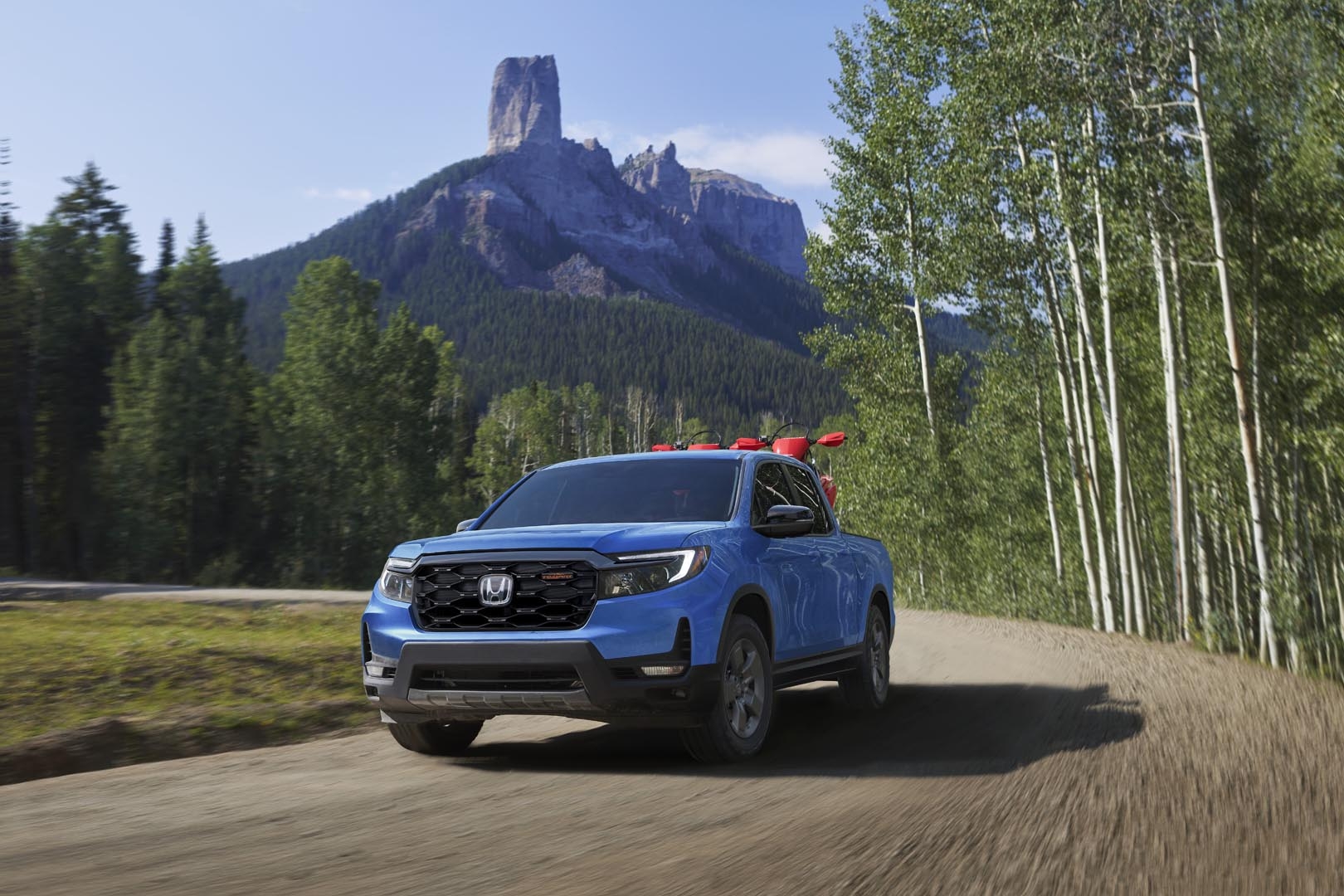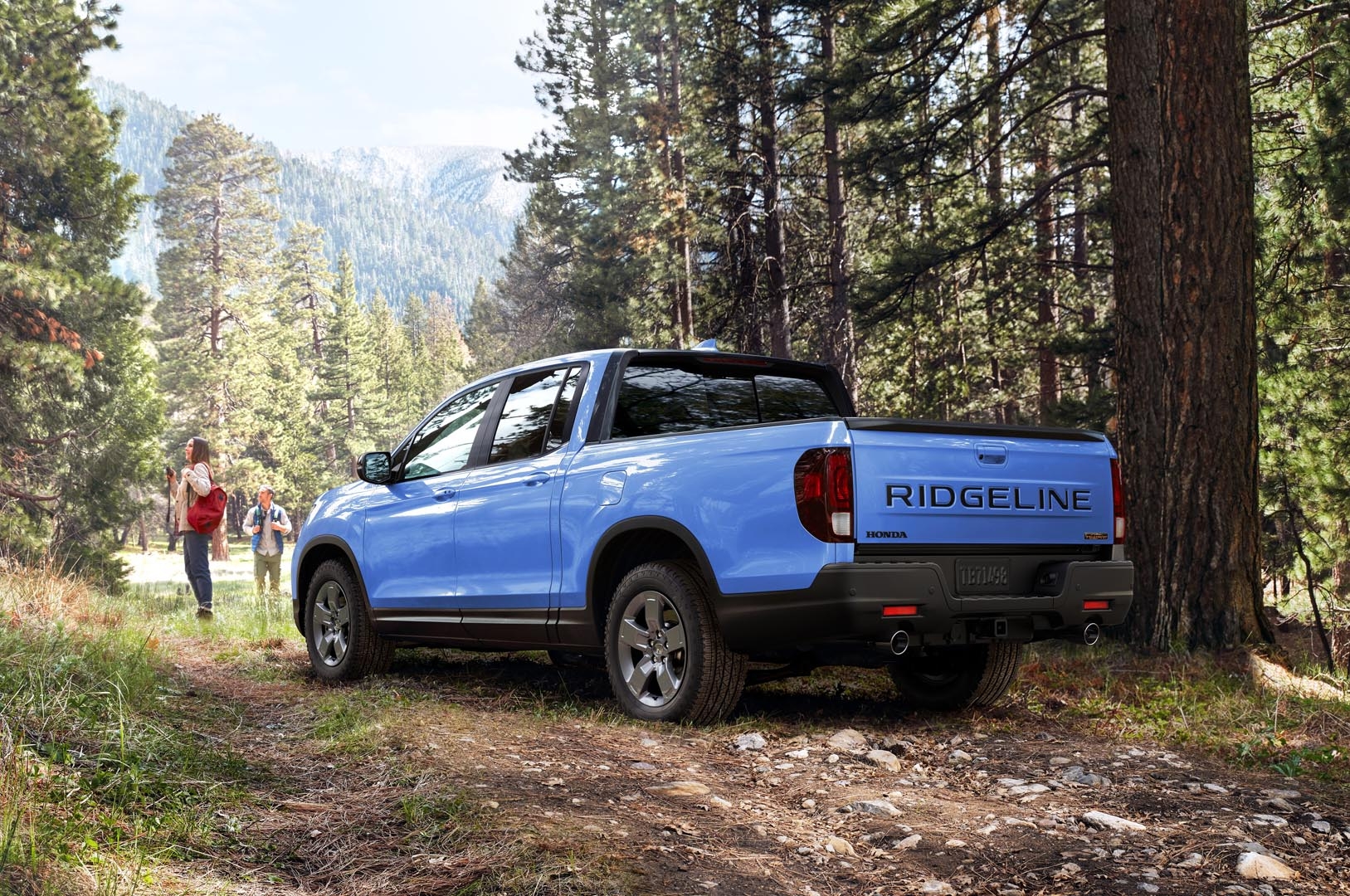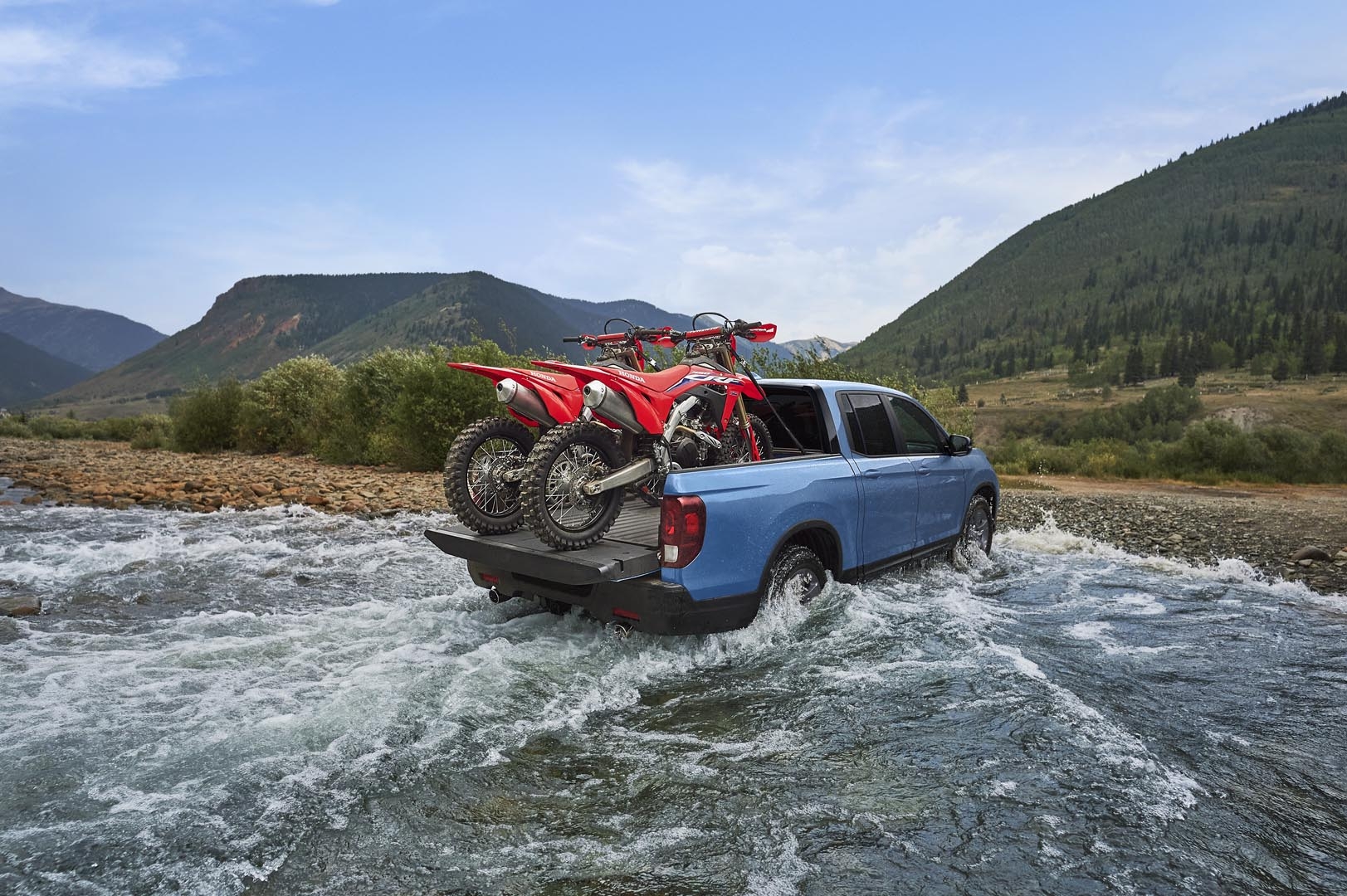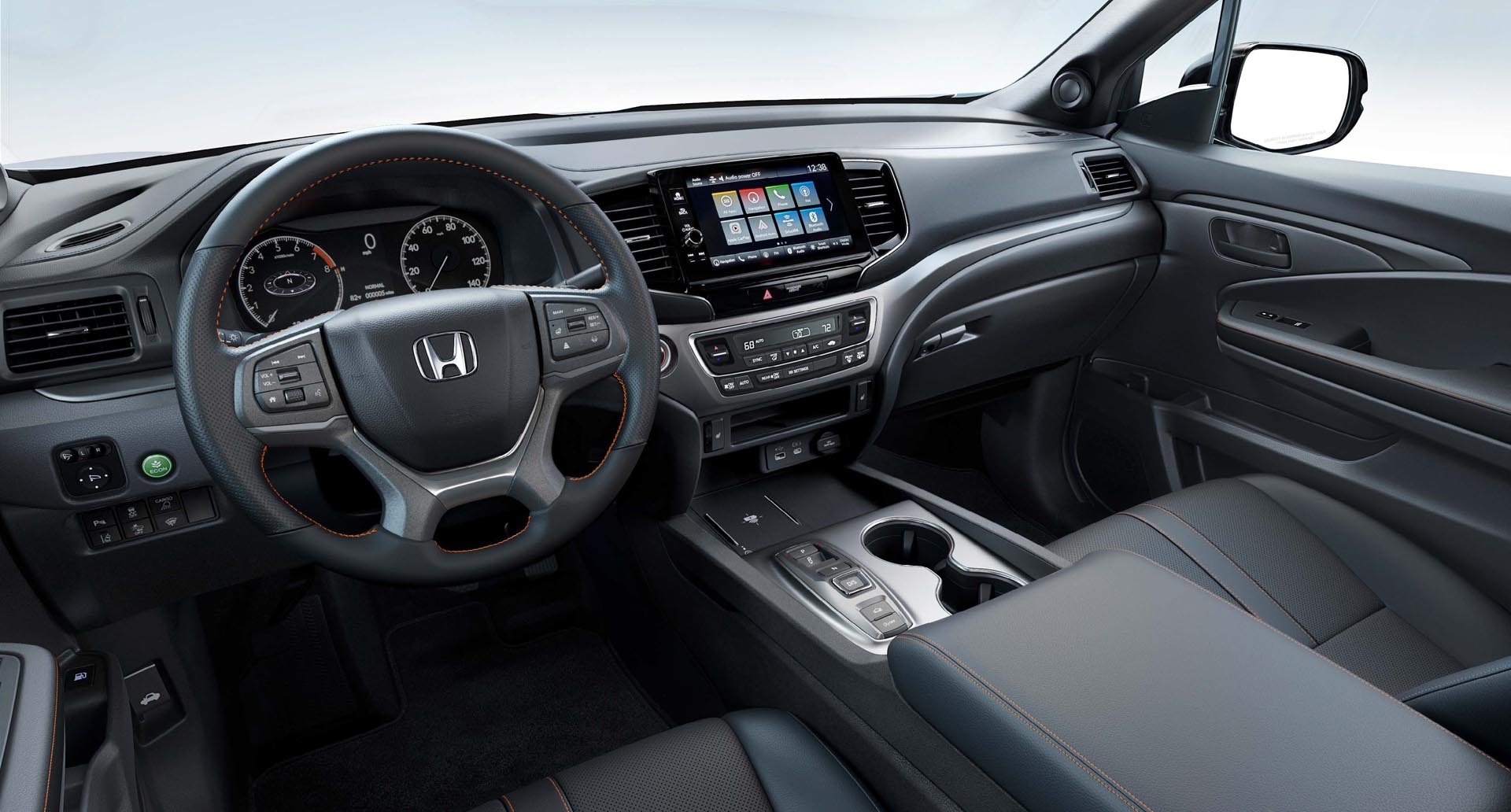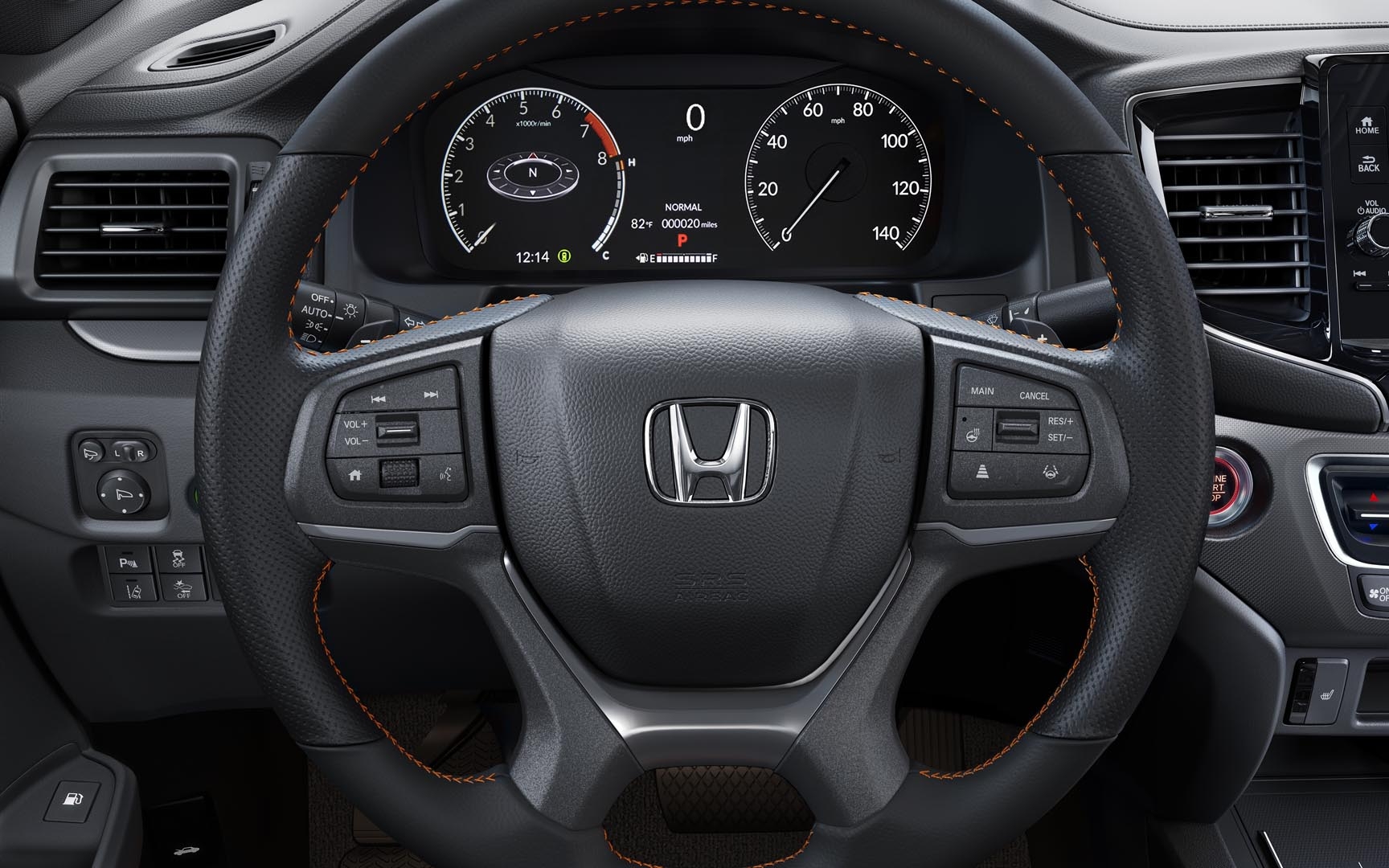
HONDA Ridgeline 2025
The most civilized mid-size pickup truck, by far
Pros and cons
Pros
- Refined and relatively frugal V6 engine
- Greatly improved transmission
- Unparalleled stability for a pickup
- Comfortable ride
- Practical trunk under the bed floor
- Roomy and easily accessed cabin
Cons
- Lower capacities than the competition
- Low engine torque at low revs
- Steering too light
- Restricted line-up
- Noisy off-road tires (TrailSport)
Overview
When you think of a midsize pickup, names like Tacoma, Ranger or Colorado come to mind. These take, on a smaller scale, the recipe of full-size trucks like the Tundra, F-150 and Silverado: body-on-frame construction, raised suspension and a traditional 4x4 system. With its front-wheel drive, transverse engine and unibody structure, the Ridgeline stands out.
Who is this iconoclastic pickup, which has undergone several changes since its 2017 refresh, aimed at? To find out, we took the wheel of the TrailSport version, launched last year to appeal to adventurous spirits.
This new variant replaced the EX-L, which had a more boulevard than off-road orientation. Honda also elected to eliminate the Touring trim, which sacrificing only a few styling gimmicks to the Black Edition, but allowed savings of $1,800.
For 2025, the entry-level Ridgeline Sport retails for $53,490, or $1,500 more than last year, without any significant addition of equipment. The increase is $1,000 for the TrailSport ($56,990) and $500 for the Black Edition ($59,490). Although several rival pickups have a lower starting price, all easily exceed $50,000, or even $60,000 with popular equipment.
The competition also has higher load and towing capacities than the Ridgeline, as well as much more extensive customization possibilities. On the other hand, Honda's pickup stands out with storage solutions and road handling that are unique in the segment.
Verdict
If you’re determined to tow a full-size trailer with a midsize pickup, you’ll want one of the many models that combine a truck chassis with a rebellious style. Just be aware that you’ll have to do without the Ridgeline’s smoothness, ingenuity and some of its exceptional civility. When it comes to combining the comfort of a crossover with the practicality of a truck bed, Honda’s pickup remains the champion. The Ford Maverick and Hyundai Santa Cruz can do it for less money, but they do so at the cost of rear-seat space and a foot or so of bed length that some people may not want to give up.
Evaluation
A smooth and increasingly rare V6
The Ford Ranger, the Chevrolet Colorado/GMC Canyon duo and the Toyota Tacoma have all adopted a turbocharged four-cylinder in recent years. Not the Ridgeline, which has remained faithful to the 3.5-litre V6 installed for more than 15 years in all of Honda’s large vehicles. Modernized over time, this engine still doesn’t “pull” as much at low revs as a supercharged motor, but it remains lively up to the red zone of the tachometer. So much the better, since you sometimes have to tease these high spheres when towing heavy loads, for example. The Ridgeline’s climbs up there with better refinement than all others in the segment, even the six-cylinders of the Jeep Gladiator and Nissan Frontier.
The nine-speed transmission frankly surprised us with its smoothness and flawless ratios. Although it remains sometimes slow to downshift, this unit made by specialty supplier ZF has made enormous progress, ditching its once notorious harsh and hesitant low-speed shifs. It also helped to keep the consumption of our test vehicle just under 11.0L/100km in average city-highway, a remarkable result for a truck weighing over 2000kg.
The good manners of a sedan
No rival of the Ridgeline approaches its stellar comfort-to-handling equation. The Ridgeline behaves (almost) like a car on expansion joints and in turns, where other mid-size trucks tend to wobble and lose composure.
The compliant suspension does not cause unexpected rebounds, and directional stability is very good on the highway. This is an impressive trait, given the light steering and the presence of all-terrain tires on our test model. Besides, if it weren't for the noise these tires make at cruising speed, the refinement would be on par with that of a sedan. It's certainly possible to get a similar ride behind the wheel of a full-size pickup, but we haven't experienced anything like it in a midsize model yet.
Comfort is key
Honda has slightly updated the interior for 2024, notably installing a new steering wheel and revised digital instrumentation. The Ridgeline still feels a bit long in the tooth when comparing its cabin with that of its freshly remodeled competitive set. The trade-off for this less "techy" environment is the presence a whole bunch of physical controls that are very easy to use.
In addition, the driver benefits from an excellent driving position that bridges the gap between a car and a pure truck. Supportive front seats and a spacious rear passenger area also make the Ridgeline a better family vehicle than most of its competitors.
Clever, but not as robust as the competition
When you need to shelter cargo from the elements in a midsize pickup, you generally have to sacrifice rear passengers by raising the bench seat. Unless, of course, you install a tonneau cover—and even then, that doesn’t make the bed completely waterproof. Honda stands out by offering a closed storage compartment under the bed floor. Lockable, waterproof, and equipped with a drain, this 207-litre space is enough to hide items as large as a cooler, for instance. The Ridgeline is also the only one of its kind with a tailgate that can be lowered or opened from right to left, which allows easier access to the front of the bed.
However, the unibody structure shows its limits in terms of payload and towing capacity. All other mid-size pickups can haul more than the 677 to 687kg (about 1,500lb) allowed in the Ridgeline, with the exception of certain versions of the Nissan Frontier. The competition can also tow more than the 2267kg (5000lb) allowed by Honda, with an advantage of up to 1225kg (2700lb). GM and Ford models also offer a host of factory-installed conveniences, such as trailer brake control or automatic trailer light check, which are absent from Honda. At least the Japanese manufacturer offers a hitch and a 7-pin connector as standard.
Look elsewhere for customization
Honda has streamlined the Ridgeline line-up to three versions in 2024, without any factory-installed packages or options. Typical of the manufacturer, this strategy greatly simplifies the choice of a model and the ordering by dealers. On the other hand, it severely limits the possibility of "building" a vehicle according to specific needs, a habit well established among pickup buyers.
While the four-door crew cab is now the near-consensus, many rivals continue to offer a selection of engines, bed lengths, drivetrains, and other features directly from the manufacturer. None of that exists for the Ridgeline. Honda’s website, however, lists a slew of dealer-installed accessories, from running boards—more cumbersome than useful in such an easily-accessed vehicle—to a tonneau cover and an underseat storage bin. Whether that’s enough is up to you.
Safety features
- Antilock brakes with electronic brake-force distribution and brake assist
- Stability and traction control
- Hill-start assist
- Front airbags
- Front side airbags
- Side curtain airbags
- Front seat belts with pretensioners
- Four head restraints (adjustable front and fixed rear)
- Rear-seat bench reminder
- Backup camera
- Tire pressure monitoring system with proper pressure signal
- Forward collision warning system
- Automatic front emergency braking
- Lane departure alert with automatic steering assist
- Active lane control
- Auto high beam
- Adaptive cruise control
- Blind-spot monitoring system
- Rear cross-traffic alert
- Front and rear parking sensors (standard on TrailSport and Black Edition, not available on Sport)
Crash test results
National Highway Traffic Safety Administration
Overall score: 5/5
Frontal impact: 5/5
Side impact: 5/5
Rollover resistance: 4/5
Insurance Institute For Highway Safety
Moderate overlap frontal impact: 4/4
Small overlap frontal impact: 3/4
Side impact: 4/4
Rear impact: Not tested
Roof strength: Not tested
